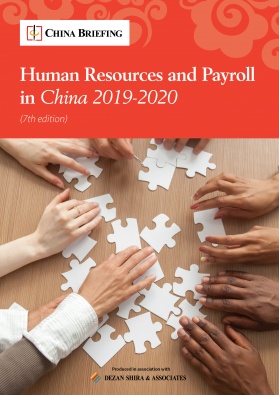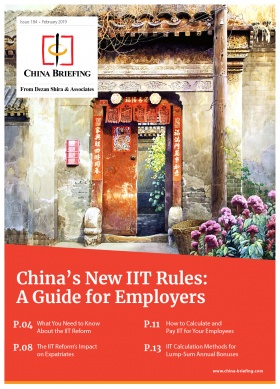Shanghai Releases Implementation Regulation for Foreign Investment Law
- Shanghai’s local government is the first to introduce regulatory guidelines for implementing the Foreign Investment Law (FIL) in China.
- The guidelines identify respective local authorities to enforce provisions of the FIL.
- Investors can expect relaxation of restrictions on foreign registered capital and investment methods in the Shanghai FTZ and Lingang New Area.
On September 18, Shanghai’s municipal government issued Opinions on the Further Promotion of Foreign Investment in Shanghai, which makes it the first regional jurisdiction to roll-out an implementation regulation for the national Foreign Investment Law. Other jurisdictions are expected to follow suit.
Although the document is still general in scope, it provides operational guidance and designates responsible local authorities to enforce China’s FIL provisions.
Consisting of 26 measures, the document seeks to implement changes in three directions through further opening up market access (5 measures), attracting foreign investment (13 measures), and protecting legitimate rights and interests of foreign investors (8 measures).
This article discusses the major implications for companies investing in Shanghai.
Further opening up the market
The first part of the Opinions defines the five policy directions of further expanding foreign investment:
- Expanding market access on the basis of implementing the “pre-establishment national treatment and negative list system” stipulated by the FIL;
- Promoting investment liberalization and facilitation of Shanghai Pilot Free Trade Zone (FTZ) and Lingang New Area by introducing more innovative policies;
- Encouraging foreign investment in strategic emerging industries and key producer service industries;
- Implementing the central government’s plan for opening up the financial sector; and
- Attracting regional headquarters of transnational corporations.
Consistent with China’s new Catalogue of Encouraged Industries for Foreign Investment, this document reiterates encouraging foreign investment in high-tech or high-end industries to boost China’s industrial upgrading.
The industries especially encouraged in Shanghai include:
- Strategic emerging industries like new generation of information technology, intelligent manufacturing, biological medicine, high-performance medical devices, new energy vehicle, smart connected vehicles, aerospace, marine engineering equipment, high-end energy equipment, and new materials; and
- Several producer service industries like R&D and design, inspection and certification, supply chain management, and e-commerce.
The document also directs further relaxation of restrictions on foreign registered capital and investment methods in the telecommunications, insurance, securities, scientific research and technical services, education, and health sectors in the Shanghai FTZ and Lingang New Area.
Following the country’s overall plan for financial opening-up, the Opinions also directs the relaxation or removal of restrictions on the proportion of foreign ownership in Shanghai’s financial institutions to promote the city as global financial center.
Finally, the Opinions aim to shore up the city’s power to attract regional headquarters of multinational corporation (MNC). Recently, on July 26, Shanghai issued the Proposals on Promoting the Development of Regional Headquarters of Transnational Corporations (Hufugui [2019] No.30) that relaxed assets and organization requirements for parent companies of MNC.
Attracting foreign investment
In terms of attracting foreign investment, the Opinions put forward 13 measures.
Important measures are “supporting foreign-invested enterprises to expand financing channels by listing on China’s stock markets, including the Main-Board Market, Second-Board Market, Small and Medium-Sized Enterprise (SME) Board Market, and New Over-the-Counter (OTC) Market and issuing corporate bonds in accordance with laws and regulations.”
Moreover, the document vows to facilitate entry and exit and work permits for foreign talents and ensure housing, children’s education, and medical care for foreign professionals.
Protecting the legitimate rights and interests of foreign businesses
This part of the Opinions puts forth eight measures to optimize the business environment, promote fair competition, protect interests and rights, especially intellectual property rights of foreign investors, and establish a complaint mechanism for foreign investors.
The document says that the government will establish a redressal system to answer and resolve foreign-invested enterprises’ various questions and problems.
No administrative means shall be used to force foreign investors and enterprises to transfer technology. No government department will be allowed to hinder the legal transregional operation, relocation, and cancellation of foreign-invested enterprises.
No breach of contract shall be made on the grounds of change of government term, replacement of departments or personnel, or policy adjustments.
Why Shanghai is pursuing reforms alongside market opening
With China’s labor-intensive and export-oriented industries shifting to lower-cost countries, especially ASEAN markets and the protracted US-China trade war affecting company bottom lines, the Shanghai government senses the need for urgency in implementing high level reforms.
These include trade and investment liberalization as well as market facilitation policies to attract greater foreign investment and resist the economic downturn.
This year, on March 15, China’s new FIL was passed and will come into effect from January 1, 2020. The country’s 2019 negative lists and encouraged catalogue for foreign investment also came into force from July 31.
Shanghai as one of China’s showcase cities and a major investment hub, has actively responded to the central directives to open up:
- On May 23, it become the first Chinese city to adopt the Decision on Implementing Foreign Investment Law;
- On August 20, Shanghai expanded its FTZ and established the Lingang New Area; and
- On November 5, it will hold the second China International Import Expo (CIIE).
From January to August this year, the amount of new foreign-funded projects, contractual foreign investment, and actual foreign investment in Shanghai continued to grow rapidly – up 47.8 percent, 9.6 percent, and 13.4 percent, respectively, according to data released by the Shanghai Municipal Commission of Commerce.
Until the end of August, a total of 701 regional headquarters, 106 Asia-Pacific headquarters, and 451 R&D centers of transnational corporations were set up in Shanghai.
About Us
China Briefing is produced by Dezan Shira & Associates. The firm assists foreign investors throughout Asia from offices across the world, including in Dalian, Beijing, Shanghai, Guangzhou, Shenzhen, and Hong Kong. Readers may write to china@dezshira.com for more support on doing business in China.
- Previous Article In China, For China – Limiting Tariff Risks, Serving Chinese Consumers
- Next Article China Clarifies Input VAT Credits for Domestic Transport Services








